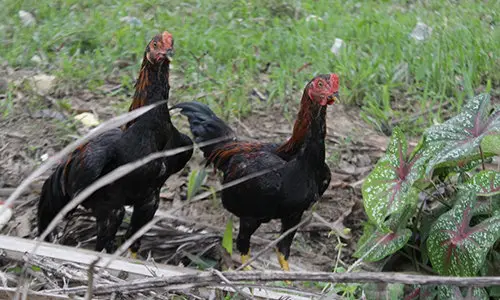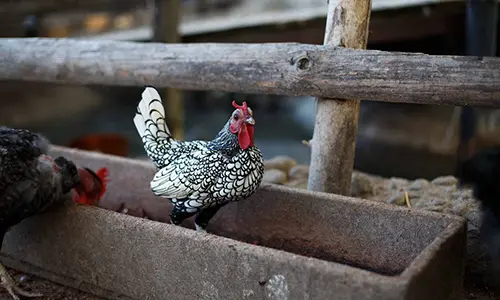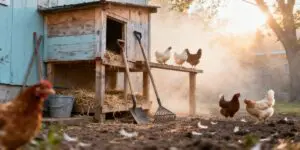In both urban and suburban areas, these chickens are gaining popularity.
Chicken keepers are finding these tiny chickens to be an ideal addition to their flock. These mini chickens are called bantam chickens.
Bantam Chickens or Mini Chickens
Bantam chickens are half to a third of the size of a standard chicken.
These ones might be small, but that doesn’t take away that they are a great addition to your flock. Bantams were first discovered in Bantam, Indonesia – which is where they got their name.
Types of Bantams
There are two different types of bantam chickens – the developed and true breed.
Developed bantams are bred small from larger breeds, such as: Japanese, Pekin, Booted, and Frizzle.

True bantams are those ones that naturally come in small sizes and have no standard-sized complement. Examples: Rosecomb, Sebright, and Nankin.

Most of the bantam chickens you find in farm stores and hatcheries are developed, as most were bred to become mini versions of known breeds.
Their Characteristics
The average weight is just over a pound. They are about a foot tall and have elegant features. Bantams may be small, but they are also strong and resilient and can live as long as, if not longer – than the usual chickens.
Their eggs are small, like the chickens. They are about half the size of the standard chicken eggs.
Related: Chicken Secrets Nobody Told You About

This Is Why You Should Raise Mini Chickens
- Bantams are easy to handle. If you’ve dealt with standard chickens, then you know how difficult they are to handle. Bantams are well behaved, making them easy to care for and control.
- Save money on chicken feed. They eat less than standard chickens, so they need half as much chicken feed as the latter. That can save you a lot of money on supplements, treats, and feed.
- OK for you children. If your kids love helping out with the chicken chores, bantam breeds are a great choice. These mini chickens are friendly and tend to have pleasant tempers that kids can handle.
- They take up less coop space. Because bantams are small, they will take up less space than the standard chicken in the coop, which allows you to add a few more chickens to your flock.
Raising Bantams
This is the same as raising standard chickens. They just need shelter, healthy food and water.

Things to watch out for
- Predators: bantam chickens are at greater risk of being attacked by predators than standard ones, as they can be easily carried away by eagles or hawks, unlike the larger breeds that are too heavy for these predators. Bantams often tend to be slower than the larger breeds because of their short legs. If a predator attacks, bantams will be outrun by the larger chickens and will be attacked first as they will be the easiest target.
- Bullying: larger breeds tend to bully bantam breeds. While most of the flock gets along well, there are some times that standard breeds pick on the bantam breeds. This type of behavior varies in different flocks, so I can’t say for sure that your chickens will have this issues. Most of the time, when you raise standard and bantam chickens together from chicks to adulthood, they will get along without any bullying. However, if you introduce new chickens to a flock, some bullying may occur.
- Climate: although all chickens need protection from certain elements, the statement reigns supreme with bantam breeds. Their small stature make them susceptible to a greater risk of hypothermia in cold climates. That doesn’t mean you can’t raise bantams in these climates – just that you’ll have to take extra precautions to ensure their protection. To do that, you’ll have to feed them healthy winter feed and insulate their coop while keeping it free from drafts.
Even though you may encounter challenges when raising bantam breeds, you should consider raising them, as they are a delight to have around. Bantam breeds are sure to bring bliss and happiness to your flock, and their tiny eggs are delicious.
You may also like:
 How To Raise Quails And Why You Should Do It
How To Raise Quails And Why You Should Do It
What Happens When You Keep Your Meat in Salt For 1 Month (Video)
A Warning To All New Homesteaders
10 Common Mistakes You Should Avoid If You Want To Raise Chickens
Livestock Animals You Should Start Raising For The Upcoming Economic Crisis















I Love This! I just found what I have been looking for.